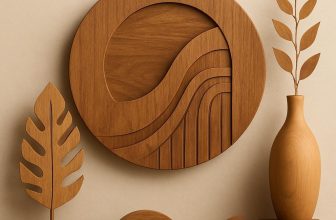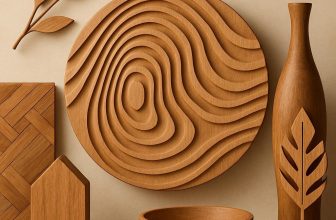
Your backyard could be a showroom for craft, where sunlight frames every cut adn the scent of cedar lingers in the air. outdoor woodworking challenges you to plan for weather, scale, and durability while expanding your repertoire beyond the workshop. This topic matters to woodworking enthusiasts because outdoor pieces extend your skills into real-world use and invite daily interaction with the craft. in this article,you'll learn how to choose projects that fit your space,select durable materials,optimize joinery for weather,and apply finishes that stand up to sun and rain. Practical ideas, clear steps, and design tips await:
elevating your backyard with durable outdoor furniture projects
Durable outdoor furniture begins with smart wood choices and robust construction. Start with weather-pleasant species such as ipe, teak, cedar, or treated hardwoods, and pair them with corrosion-resistant hardware. Design for water-shedding joints and adequate drainage, and choose joinery that resists wobble over time, like mortise-and-tenon or dowel-dimensional connections. A high-quality sealant or oil finish that penetrates the grain will help weather sun, rain, and seasonal temperature swings with less maintenance.
Durability shines when a project serves multiple purposes and is built to last. Here are durable projects you'll love:
- Adirondack chairs with wide slats,curved backs,and solid footers; use mortise-and-tenon joints and exterior-grade finish for comfort and longevity.
- storage bench with seating featuring a water-tight lid, moisture-resistant liner, and hidden hinges to keep cushions dry.
- Outdoor dining table with benches crafted from thick slats and braced legs-allow for seasonal movement with slotted gaps and proper bracing.
- Planter bench or coffee table combo that doubles as a storage nook; planters lined to prevent rot and a smooth, sealed surface for casual use.
Durability also hinges on hardware and finish choices. Use stainless or silicon-bronze fasteners, recessed hardware where possible, and seal joints to prevent moisture ingress. The following finish options pair well with outdoor timber and climate considerations, offering a swift reference for choosing the right protection:
| Finish | Pros | Best For |
|---|---|---|
| exterior-grade oil | Penetrates grain, easy touch-ups | Cedar, pine |
| Marine varnish or exterior polyurethane | Excellent water barrier, long life | Ipe, teak |
| Water-based sealant | Low odor, quick recoat | Softwoods, painted surfaces |
Maintenance is the practical backbone of lasting outdoor furniture. Schedule seasonal checks for lose joints, tighten hardware, and reapply protective finishes as needed. Store pieces with good airflow during harsh winters or heavy rain seasons, and consider modular designs that allow you to swap components without rebuilding. Start with one durable piece to build confidence, then scale up to a complete backyard set that ages gracefully with your space.
Build Your Dream Workshop on a Budget →
Building weather resistant decks and patios for lasting appeal
Weather resistance starts with smart material choices and thoughtful detailing. For decks and patios that endure sun, rain, and seasonal freezes, pick woods with natural durability or finishes designed to endure outdoor cycles. Options like pressure-treated pine for structural members, cedar or redwood for surfaces, and thermally modified woods offer a balance of stability and beauty. Pair boards with hidden fasteners and corrosion-resistant hardware (stainless steel or hot-dip galvanized) to minimize visible wear, and flash the ledger and flashing at all points where water can wick into the frame. Slope the deck away from the house at about 1/8 inch per foot to promote drainage and reduce water pooling near doors.
Substructure and drainage: Build on solid footings sized for your climate and soil conditions, and keep a small air gap between the decking and the ground when possible to slow moisture transfer. Install proper flashing behind the ledger, and seal all joints to prevent moisture invasion. Use drip edges or a cap flashing at transitions to divert water away from fasteners and beams. If you live in freeze-thaw regions, use frost-protected detailing and ensure deck boards have a slight gap to account for expansion.
Finishes and protection: Choose UV-stable sealants or penetrating stains that allow the wood to breathe, rather than thick film-forming coatings that peel.Recoat every 1-2 years for surface finishes, or as recommended by the product, and always clean first to remove dirt and mildew. For a low-maintenance look, select a neutral stain that hides dust and weathering, and pair it with weatherproof lighting and rail hardware to keep the space inviting year-round. Consider shade structures such as a pergola or retractable awning to shield exposure while still showing the woodS grain.
| Task | Frequency | Tip |
|---|---|---|
| Clean surface | 6-12 months | Soft brush and mild cleaner; avoid high-pressure wash |
| Inspect fasteners | every 6-12 months | Tighten or replace loose/corroded hardware |
| Re-seal/coat | 1-2 years | Apply penetrating stain/sealant after cleaning |
| Check flashing/ledger | Annually | Inspect for rust and water intrusion; repair promptly |
Maintenance plan and design ideas: A simple upkeep routine will preserve color and strength. Create a quick care checklist and integrate it into annual home maintenance. For example,use the following schedule as a starting point to keep your deck looking and performing its best.With a predictable care schedule, your deck stays safe and inviting for years.Design with modular panels and accessible fasteners so repairs are quick, and materials can be swapped without a full rebuild. By planning for drainage, shade, and proper ventilation from the start, your outdoor space remains comfortable, durable, and ready for gatherings year after year.
Build Your Dream Workshop on a budget →
Crafting smart storage solutions for an organized outdoor workshop
Think of your outdoor workshop as a living system: every tool has a home, and every home minimizes hunt time.Smart storage begins with a wall plan that keeps frequently used items within reach and seasonal gear out of the way.Weatherproof materials, like marine-grade plywood, cedar, or powder-coated steel, help withstand sun, rain, and temperature swings. Start by mapping zones: hand tools,fasteners,finishes,and clean-up supplies,then place them in clearly labeled containers.
Opt for modular,adjustable solutions that can grow with your projects.A sturdy pegboard wall above the workbench makes chisels, clamps, and gauges easy to see and grab. Under the bench, install a shallow drawer or tray system for small parts, while higher shelves hold less-used items. Use weather-sealed bins and clear labeling so you can spot contents at a glance even from a distance. Mobility matters: a compact rolling cart keeps shims, tapes, and sanding discs mobile for on-site tweaks.
To help you plan, consider a compact layout that balances accessibility with protection. Create zones for raw materials (store off the ground),finished work (near the vise),and waste/cleanup (a dedicated bin). Use a simple storage table to compare options:
| Storage Solution | Ideal Space | Best For |
|---|---|---|
| Pegboard wall | 4-6 ft long | hammers, chisels, small tools |
| Under-bench drawers | 24-30 in width | Fasteners, screws |
| Clear bins on shelves | 2-3 ft shelf height | Hardware, small parts |
| Ceiling-mounted slatwall | Full width of work area | Less-used materials |
build a maintenance routine into your week: spend 15 minutes labeling, adjusting, and tidying. A well-kept shop speeds up every project and reduces misplacement of precious bits.Document your layout with a simple sketch and revise it after you finish a few projects, so your setup grows with your craft.
Build your Dream workshop on a Budget →
Choosing materials and finishes that withstand sun and rain
Choosing materials with sun and rain in mind starts with understanding how weather interacts with wood. Ultraviolet rays (UV) fade color and weaken fibers over time, while moisture triggers swelling, rot, and mildew if the wood isn't properly sealed. For backyard projects that hold up season after season, start with a wood species known for natural decay resistance or a solid exterior finish plan, and budget for ongoing maintenance rather than a one-and-done solution. The right pairing of material and finish makes a big difference in both appearance and longevity.
Common outdoor-friendly species include cedar, redwood, teak, and ipe, plus treated pine for budget projects.Each has its own strengths: cedar and redwood are lighter and absorb finishes well; teak contains natural oils that help resist moisture; ipe is incredibly dense and decay resistant. For long-lasting performance, consider the environment: coastal areas demand higher moisture resistance, while sun-baked patios benefit from color-rich finishes that resist fading. See the quick comparison below to guide your selection.
| Wood type | Sun durability | Rain durability | Typical maintenance |
|---|---|---|---|
| Cedar | Good | Moderate | Reapply sealant every 2-3 years |
| Redwood | Good | Good | Inspect annually; reseal as needed |
| Teak | Excellent | Excellent | Oil or sealer every 1-2 years |
| Ipe | Excellent | Excellent | Refresh sealant every 2-4 years |
| Pressure-treated pine | Moderate | Moderate | Annual maintenance; rot checks |
finishes act as the first line of defence after choosing the material.Use exterior-grade finishes with UV inhibitors and water repellents; pigment-rich stains help hold color in strong sun, while clear sealers preserve the natural look. For timber that faces rain, ensure the finish is waterproof, breathable, and compatible with tannin-prone woods to avoid ambering or peeling. Request tips include prepping by cleaning and sanding,applying thin,even coats,and following the manufacturer's recoat times; plan maintenance every 1-3 years depending on climate and wear. In harsher climates or seaside settings, you may need annual touch-ups and a complete re-coat every 2-4 years to keep the finish sealing the wood.
Build Your Dream Workshop on a Budget →
Designing a compact outdoor workspace for woodworking beginners
begins with honest space mapping and a clear workflow. Start by outlining a footprint that fits your yard without obstructing paths or shade. Create three zones in sequence: a cutting station, a finishing/assembly nook, and a small storage area for clamps, guides, and scrap material. Choose weather-resistant surfaces and modular components that flex with the seasons, so you can expand or reconfigure as your projects grow. A simple, durable base-pavers or sealed decking-keeps feet dry and tools stable, while still preserving the open-air feel.
Select a compact workbench that can withstand outdoor conditions and daily use. Look for a top that grips workpieces and a frame that won't wobble with vibration. For many beginners, 34-36 inches is a comfortable height, and a bench with interchangeable wings or a fold-away option saves space on smaller lots. Pair it with a couple of sturdy clamps, a portable vise, and a wall-mounted pegboard to keep hand tools within reach without turning the area into a cluttered corner. If space is tight, consider a two-tier setup: a lower primary surface for cutting and a narrow upper shelf for light tasks and supplies.
| Element | Benefit | Example |
|---|---|---|
| Work surface | Stable, comfortable height for tasks | Bench at elbow height (34-36 in) |
| storage | Quick access reduces trips and interruptions | Pegboard, wall bins, rolling cabinet |
| Weather protection | Prolongs tool life and maintains cleanliness | Overhang canopy or tarp |
Layout and weather protection go hand in hand. Position the bench with good natural light and a leveled, non-slip surface. Use a lightweight canopy, shade sail, or tarp to shelter you and your tools from rain and sun, while still allowing ventilation. For dust and debris, set up a simple outdoor dust management plan: a shop vacuum or blower near the work zone, plus a portable trash caddy for scraps. A small, weatherproof storage cabinet or rolling tote keeps finishes, brushes, and rags dry and secure. See the quick reference table above for a compact setup checklist.
quick-start weekend plan: To get up and running in a weekend, follow these steps: 1) pick a level, drainage-friendly corner with a sun position you prefer; 2) assemble and anchor a compact workbench and install a pegboard wall; 3) configure a storage system with clamps and a rolling tote; 4) add wind and weather protection, plus a dedicated outdoor power source with GFCI if needed. Keep a safety kit handy and maintain a tidy zone to minimize miscuts or tool swaps.After a few projects, revisit the layout to improve flow and keep the space inviting.
Build Your Dream Workshop on a Budget →
Maintenance and care routines to extend your outdoor woodwork
Regular maintenance is the secret behind durable, good-looking outdoor woodwork. Start with a simple clean: sweep away debris, then wash with a mild soap solution and a soft-bristle brush.Avoid high-pressure washers that can raise grain or force water into the wood. Rinse with a gentle spray and dry wholly before you proceed. As you inspect, keep an eye out for cracks, warping, or areas where water pools; catching small issues early prevents bigger repairs later. For woods like cedar or treated pine, a light clean can prevent mildew and keep the color consistent.
Protect with the right finish. A UV-resistant sealer or penetrating stain helps water bead and slows graying. Before applying, sand lightly to remove fuzz and ensure the finish adheres. Wipe away dust, then apply even coats following the product's directions; typically one to two coats suffice for most exteriors. recoat every 1-3 years depending on exposure, climate, and product quality. In luminous sun, near salt air, or on frequent rain routes, plan for more frequent refreshes. Keep finishes away from extreme heat and fumes, and work in moderate conditions for best results.
| Season | Focus | Suggested Frequency |
| Spring | Inspect, clean, and touch up if needed | Annually |
| Summer | Protect from sun and moisture; recoat if needed | Every 1-2 years |
| Fall | Deep clean; address cracks or loose fittings | As needed |
| Winter | Moisture protection; cover or winterize | Seasonally |
Maintenance also means checking hardware and drainage. Tighten screws, oil hinges, and replace any corroded hardware, and promptly re-seal cut ends or joints with a wood preservative to slow moisture ingress. Inspect for rot or insect damage and replace damaged boards rather than patching. For seasonal care, use breathable covers and store cushions indoors when not in use, and ensure good drainage around base structures to prevent standing water. A quick annual walk-around-look for loose boards, water stains, or staining-keeps surprises minimal and your backyard project thriving.
Build Your Dream Workshop on a Budget →
Q&A
What are some beginner-friendly outdoor woodworking projects that still elevate a backyard?
Plan simple,functional pieces like planter boxes,a garden bench,or a birdhouse. These projects use basic cuts and straight lines, which makes accuracy forgiving. Choose weather-resistant wood such as cedar or pressure-treated pine and finish with a sealant to extend life.
How should I choose wood and finishes to maximize durability outdoors?
Opt for exterior-rated lumber like cedar, redwood, or pressure-treated pine, which resist decay in outdoor conditions. Use exterior-grade finishes-a deck stain, sealant, or paint-that block moisture and UV damage, reapplying when recommended. Remember to seal end grains and joints to slow water ingress.
What safety steps should I follow when woodworking outdoors?
Wear safety glasses, hearing protection, and a dust mask; keep tools sharp and use clamps to secure workpieces. Work in dry, well-ventilated conditions and avoid using power tools in rain or high winds. Clean up sawdust and organize your tools to prevent trips or slips in an outdoor space.
What planning tips help me optimize space and budget for outdoor projects?
Measure your space first and sketch a simple plan with a cut list to minimize waste. Consider modular or stackable designs you can reuse in future projects, so pieces feel cohesive. Track materials and finishes costs, and look for reclaimed boards or offcuts to stretch your budget.
Closing Remarks
Ultimately, the message is simple: thoughtful design, quality materials, and patience transform an outdoor project into a lasting companion for weekends and gatherings. The takeaway is to pair your choice of project with the climate, maintenance habits, and your own rhythm of work, so results endure.For woodworking enthusiasts, these exercises matter as they extend craft beyond the shop-into the yard, the air, and the stories told around a finished bench or planter.Now pick one project, skim a guide for tips, or map out your own variation.Start small, stay curious, and let your backyard become a living workshop of possibility.







These projects are a fantastic way to combine creativity with practicality! Can’t wait to try building that rustic bench and add some charm to my yard!
These ideas are so inspiring, Scott! I love the thought of creating something beautiful for the outdoors-it’ll definitely make my backyard feel more like home.
Absolutely love these ideas, Scott! There’s something so rewarding about crafting wooden pieces that not only enhance the beauty of a backyard but also offer a personal touch. Excited to get started on some of these projects!
I’m thrilled to see such creative outdoor woodworking projects being shared, Scott! It’s amazing how a few handmade touches can transform a backyard into a beautiful and inviting space. Let’s get building!
What a fantastic collection of projects, Scott! I can’t wait to dive into these ideas and bring some personalized flair to my outdoor space. It’s great to see how woodworking can truly enhance our backyards!
This post has sparked my imagination, Scott! I love how these woodworking projects not only beautify the space but also provide a fun way to enjoy some quality time outdoors. I’m definitely adding some of these to my weekend to-do list!
What an inspiring post, Scott! These woodworking projects seem like the perfect way to add character to any backyard. I can’t wait to try my hand at some of these and make my outdoor space even more welcoming!
These projects are incredible, Scott! I’m really inspired by the creativity and craftsmanship involved. They seem like the perfect addition to make any backyard feel like a cozy retreat. Can’t wait to get my tools out and start building!
These ideas are amazing, Scott! I’m excited to try some of these woodworking projects in my backyard-they’re a wonderful way to express creativity while making my outdoor area more enjoyable. Thanks for the inspiration!
These projects are fantastic, Scott! I love how they combine functionality with aesthetic appeal, transforming any backyard into a stunning oasis. I’m excited to start crafting my own pieces and make my outdoor area even more inviting!
These ideas are absolutely inspiring, Scott! I love how they blend creativity and utility, and I can’t wait to tackle a few of these projects to enhance my backyard with unique pieces that reflect my personality. Thanks for sharing such fantastic inspiration!
These woodworking projects are just what I needed, Scott! They provide such a great mix of creativity and practicality, perfect for turning my backyard into a personal sanctuary. I’m excited to pick a few to work on and make my outdoor space truly my own!
I love these project ideas, Scott! They really inspire a sense of adventure and creativity for transforming my backyard. It’s so refreshing to see such innovative ways to add personality and charm to outdoor spaces. Can’t wait to get started on my own creations!
I’m thrilled to hear that you all are feeling inspired! Outdoor woodworking projects truly have the power to transform your backyard into a cozy retreat, full of character and charm. I can’t wait to see what you all create!
I’m really excited to see everyone so passionate about these outdoor woodworking projects! They offer such a wonderful way to express creativity while enhancing the beauty of our backyards. Can’t wait to share my progress and see what others come up with as well!
These project suggestions are incredible, Scott! I love how they encourage us to tap into our creativity while also being functional additions to our outdoor spaces. I’m looking forward to diving into some of these projects and making my backyard a place that truly feels like home!
These ideas are fantastic, Scott! I’m feeling so inspired to get my hands dirty and create something beautiful for my backyard. There’s nothing like the satisfaction of crafting unique pieces that add both function and style to outdoor living. Can’t wait to share my creations!
These woodworking projects are just what I need, Scott! I love the idea of blending creativity and functionality in my outdoor space. It’s amazing how such personal touches can turn a regular backyard into a warm, inviting oasis. I’m excited to start my journey and can’t wait to see what everyone else makes!
I’m so glad to see the excitement around these outdoor woodworking projects! They really have a magical way of bringing personality to our backyards, and I can’t wait to see the unique styles everyone adds to their spaces. Let’s get crafting and inspire each other!